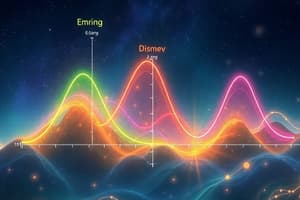Podcast
Questions and Answers
What happens to the energy of the system during a chemical reaction?
What happens to the energy of the system during a chemical reaction?
- It remains constant
- It is transferred from the surroundings
- It is created or destroyed
- It changes as bonds are broken and formed (correct)
What is the direction of energy flow in a combustion reaction?
What is the direction of energy flow in a combustion reaction?
- Into the system from the surroundings
- Within the system, but no exchange with surroundings
- From the system to the surroundings (correct)
- From the surroundings, but not into the system
What is the scientific study of the interconversion of heat and other kinds of energy?
What is the scientific study of the interconversion of heat and other kinds of energy?
- Heat Energy
- Thermodynamics (correct)
- Physics
- Thermal Energy
What is a thermodynamic system in the context of chemistry?
What is a thermodynamic system in the context of chemistry?
What does the first law of thermodynamics state?
What does the first law of thermodynamics state?
What is the net result of a reaction that releases energy to the surroundings?
What is the net result of a reaction that releases energy to the surroundings?
What happens to the chemical energy stored in the fuel during combustion?
What happens to the chemical energy stored in the fuel during combustion?
What is the primary component of fossil fuels?
What is the primary component of fossil fuels?
What is the purpose of considering energy diagrams in chemical reactions?
What is the purpose of considering energy diagrams in chemical reactions?
What happens to the energy of the system during a chemical reaction?
What happens to the energy of the system during a chemical reaction?
What is the First Law of Thermodynamics related to in a chemical reaction?
What is the First Law of Thermodynamics related to in a chemical reaction?
What is the result of the combustion reaction?
What is the result of the combustion reaction?
What is an endothermic reaction in terms of energy conversion?
What is an endothermic reaction in terms of energy conversion?
What determines the amount of energy released during combustion?
What determines the amount of energy released during combustion?
What type of reaction is described by the equation 20kcal + 15kcal = 15kcal + 35kcal?
What type of reaction is described by the equation 20kcal + 15kcal = 15kcal + 35kcal?
What can be used to represent the energy changes during a reaction?
What can be used to represent the energy changes during a reaction?
What is the relationship between the H/C ratio and energy release during combustion?
What is the relationship between the H/C ratio and energy release during combustion?
How much energy is released when 1 mole of methane (16 g) is burned?
How much energy is released when 1 mole of methane (16 g) is burned?
Flashcards are hidden until you start studying
Study Notes
Thermodynamics and Energy
- The laws of thermodynamics provide guidelines for understanding the energetics and directions of processes, with the first law being relevant to thermochemistry.
- During a chemical reaction, energy is transformed from one form to another, as bonds in reactants are broken and new bonds in products are formed.
Combustion Reaction
- Combustion is a reaction with oxygen, where the species reacting with oxygen is oxidized.
- Fossil fuels are primarily composed of hydrocarbons, which are molecules containing carbon and hydrogen bonds.
- In combustion, hydrocarbon molecules are converted to carbon dioxide and water, releasing energy in the process.
- The amount of energy released depends on the oxidation state of the carbons in the hydrocarbon, which is related to the hydrogen/carbon ratio.
Energy Release and Hydrogen/Carbon Ratio
- The more hydrogen per carbon in a hydrocarbon, the lower the oxidation state and the more energy released during oxidation.
- Therefore, a higher H/C ratio results in more energy released during combustion.
First Law of Thermodynamics
- The first law states that energy cannot be created or destroyed, only converted from one form to another.
- Energy is conserved, meaning the total energy of a closed system remains constant.
- The first law can be thought of as an energy balance sheet, where energy is exchanged between the system and its surroundings.
Energy Diagrams and Endothermic Reactions
- Energy diagrams can be constructed for endothermic reactions, which absorb energy from the surroundings.
- In these reactions, the products have higher energy bonds than the reactants, requiring energy input from the surroundings.
Studying That Suits You
Use AI to generate personalized quizzes and flashcards to suit your learning preferences.




